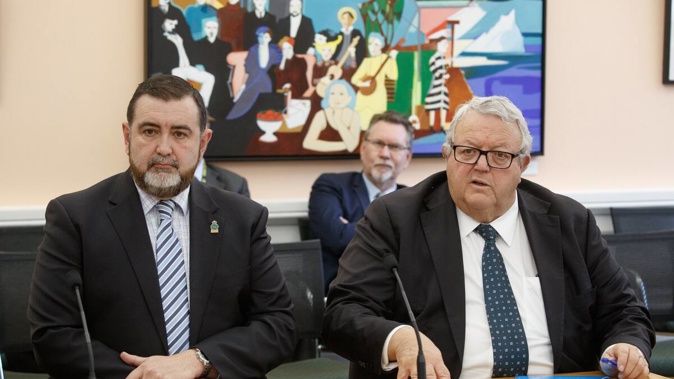
Speaker Gerry Brownlee wants to boost security for politicians while they are out in the community before something “goes very wrong.”
Options he is considering include giving Parliament’s security guards powers to arrest and detain and co-ordinating more with the Police Diplomatic Protection Service, which currently predominantly looks after the Prime Minister.
Speaking at a select committee on the Budget for Parliamentary Service, Brownlee was asked about the security of MPs.
Labour’s Rachel Boyack asked about the issue, saying when MPs were out in public they did not necessarily know where they might face risks and security was often reactive rather than proactive.
Brownlee said it was an issue that concerned him and there was a need for a better protocol between police and Parliament’s own security, who he said “don’t even have as much cover as a security guard standing outside a nightclub.”
“There is the interesting situation where you have 150 accredited Diplomatic Protection Service officers throughout the country who are available essentially to one person. It does point to the fact that there has got to be a bigger discussion with the people who have the authority to act about the power to detain, the power to arrest.”
The DPS squad protect the Prime Minister 24-7, but can also protect other politicians if police assess there is a risk to them.
Brownlee later told the NZ Herald he wasn’t necessarily saying DPS should expand its services to more MPs “but we do need to have a discussion about where the interface is between Parliament’s own security and police outside the Parliamentary environment.”
He said police were open to that discussion and he was expecting advice shortly.
He said the number of threats to MPs had increased in recent years and he did not want to wait until “something goes very wrong” to act.
“Over recent years, the number of incidents where MPs have been physically threatened have increased. My concern is that at some point you get something that goes very wrong.
“At that point, where you’ve seen in Great Britain and other countries where this has happened, everything suddenly changes, everything is all on.”
He said it was important to strike a balance between public accessibility to MPs and security around MPs going about their work “and increasingly their private activities as well.”
He said it was an issue of balance: “I’m not saying we want an all-powerful security service. But we do have to talk about, at least, where that line might be.”
“We can’t go on having circumstances where we are relying on our security to keep the place safe, but having to immediately call police to see if they can come and help them out when something goes wrong.”
Parliamentary Services head Rafael Gonzalez-Montero said last year a new service was introduced for MPs to request security at specific events. That request would trigger an advance assessment of the event and security would attend if it was deemed necessary.
“The landscape has changed quite dramatically, I would say especially after the [2022 Parliament] protest. I think we are all playing catch-up. I think we are going to get something more collated between all the agencies.”
In a recent University of Otago study, 98 per cent of 54 MPs surveyed reported experiencing harassment, 40 per cent said they were threatened with physical violence, 14 per cent with sexual violence and 19 per cent told the researchers threats were made against family members.
More than a quarter of the respondents, made up of 20 men and 34 women, said they had received death threats.
One of the more recent issues involved National MP Maureen Pugh, who was struck by a protester’s placard. Pugh was not injured but was shaken. Several MPs’ electorate offices have also been vandalised – including Luxon’s - and security at electorate offices has been boosted.
Security at electorate offices has been boosted and MPs are entitled to claim up to $4500 for installing a security system at their own home and up to $1000 a year toward monitoring, call-outs, and repairs of it.
They can also ask for extra security at their own home or their Wellington accommodation, which is based on an official risk and security assessment.
Ministers are required to have security installed in both their own homes and Wellington accommodation.
The security funding was boosted by the Remuneration Authority last year - up from $2500. In its reasoning, it said the funding had not changed since 2014 and the cost - and threats to MPs - had increased.
Claire Trevett is the NZ Herald’s political editor, based at Parliament in Wellington. She started at the NZ Herald in 2003 and joined the Press Gallery team in 2007. She is a life member of the Parliamentary Press Gallery.
Take your Radio, Podcasts and Music with you









